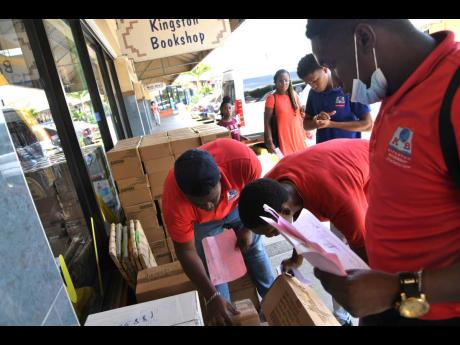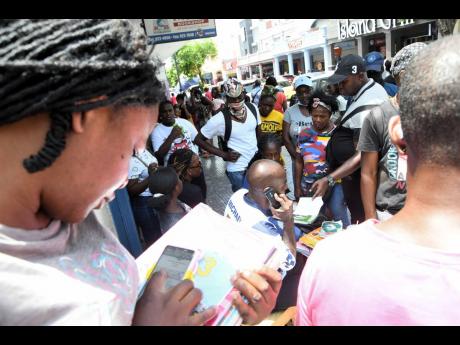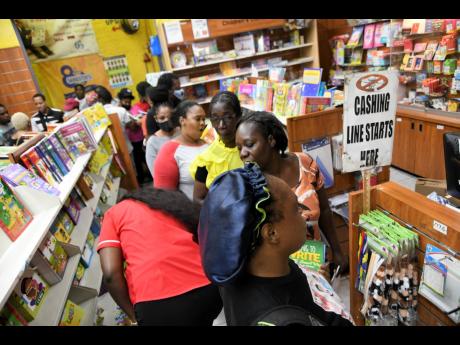Book sellers expect supply woes to ease as back-to-school shopping kicks into gear
For nearly three decades, Michael Smart has been making the purchase of textbooks more affordable for Jamaicans as they conduct back-to-school shopping in downtown Kingston. “They get the books a little bit cheaper, they avoid the crowd that is...
For nearly three decades, Michael Smart has been making the purchase of textbooks more affordable for Jamaicans as they conduct back-to-school shopping in downtown Kingston.
“They get the books a little bit cheaper, they avoid the crowd that is always at the bookshop, and we also sell second-hand books. You have people who can’t afford the new one, so I sell them the second-hand one and there are people who carry in their second-hand books and we buy them and swap back,” the owner of Jus Books said.
Smart told The Gleaner that some titles are likely to be unavailable until September.
The Book Industry Association of Jamaica (BIAJ) has advised that parents will be paying 15 to 20 per cent more for internationally published books and between 10 and 15 per cent more for locally produced ones.
Nigel Walker, interim chairman of the BIAJ, said that increased printing and shipping costs are the major issues facing the industry as the new school year inches closer.
“Paper costs have gone up by over 30 per cent in the last year and that has really driven up the printing cost by almost the same percentage. Our members now are facing the issue of getting the books here in terms of the shipping costs that have been affecting the world for the past two years since COVID-19. It has gone down a little, but not to pre-pandemic levels,” Walker explained.
Donnaree Gooden purchased books for her 13- and six-year-olds from Smart, whose business is set up on the kerb in proximity to two major book shops on King Street.
The mother found Smart’s business to be convenient as she was using her 45-minute lunch break to make the purchases and the lines at the book stores were prohibitive.
“For the infant books, the prices are not so bad,” Gooden said, adding that she has only had a challenge securing a reading book.
Tyrone Hutton also purchased textbooks for his four-year-old daughter from Smart and told The Gleaner that he intends to buy stationery supplies from small vendors.
“It’s just because I can’t take the crowd at the bookshops why I’m buying them on the street because I need to get this done in half an hour. I can’t complain about the prices. The only thing we can give our children as poor people is a good education and food,” Hutton said.
Another parent, who only identified herself as Ms Brown, said she was shopping for three children – ages two, six and 11.
“On textbooks, di prices dem kinda alright. Dem going up, but dem nuh really pressure we too much and the vendors dem outside try to help and I got some things from them at a lower price,” she said.
Brown said she could not source a few books and was still hoping to secure them before the school year begins.
Branch supervisor at Sangster’s Book Stores’ Springs Plaza outlet, Amarantha Gordon, said the global paper shortage has forced local publishers and printers to increase book prices.
“We still have to put our markup on it. The prices are somewhat affordable. Compared to last year, it’s about a five per cent increase. Persons are still walking around to ensure that they get the best prices because everybody wants to save money,” she said, adding that the majority of customers visit the store on weekends.
Gordon told The Gleaner that most customers have been purchasing textbooks for core subjects like mathematics and English, while parents of children at the early childhood level have been purchasing all the books but no stationery.
“We have a set of books that are being revised and they won’t come in until late August. Another challenge is that some of the publishers are probably trying to be on the safe side, so a lot of books are not being printed – just a limited amount. Some books are out of stock now, so our purchasing department is in contact with those publishers,” she explained.
Meanwhile, senior supervisor at Kingston Bookshop, Janet O’Sullivan, said publishers took a wait-and-see approach to printing this year.
She explained that the store recently received stock from Mid Island and Carlong Publishers and within the next two weeks, all books should become available.
“Surprisingly, people are buying all the books. Normally they don’t buy the Bible, the dictionary or the hymn book, but they are taking up everything now,” said the senior supervisor for the 74 King Street store in downtown Kingston.
SEEKING DISCOUNTS
O’Sullivan said prices are not much different from last year but customers have been asking for discounts.
“We appreciate all the customers who are coming out because during the year, things were very slow and people lost their jobs,” O’Sullivan said.
The BIAJ interim chairman said several meetings have been held with the education ministry and stakeholders about electronic books for students.
Walker said e-books were introduced in some secondary schools last year and he expects that it will continue in the new academic year.
“Most of our members have done their books in both the electronic format and in the physical copy, so we are ready when the Government is ready to go full scale. I personally believe that we are not where we need to be in terms of the resources to fully use e-books,” he said.
Walker added that a few BIAJ members are not in favour of e-books as there is a cost for conversion, especially if the publisher wants it to be interactive.
“After that, you have to pay someone to host the book online, so that you can sell it to the ministry or the final consumers. Publishers are also still worried about copyright because people have found creative ways to open books online and send it around on WhatsApp. As a result, those who worked hard to create the books lose out on income,” Walker said.



